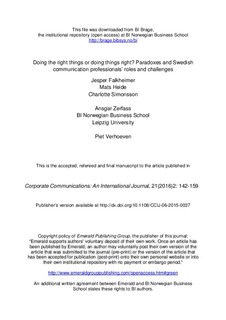Doing the right things or doing things right? Paradoxes and Swedish communication professionals’ roles and challenges
Journal article, Peer reviewed
Permanent lenke
http://hdl.handle.net/11250/2395511Utgivelsesdato
2016Metadata
Vis full innførselSamlinger
- Scientific articles [2173]
Originalversjon
Corporate Communications: An International Journal, 21(2016)2: 142-159 http://dx.doi.org/10.1108/CCIJ-06-2015-0037Sammendrag
Purpose
– The purpose of this paper is to examine and analyze the prevailing form of rationality that governs the challenges, goals and roles of communication professionals. The authors will also explore alternative forms of rationality and discuss what these would imply.
Design/methodology/approach
– The paper is based on survey results from The European Communication Monitor (ECM) and qualitative interviews with communication managers in Sweden. First, the authors present the ECM data and the Swedish interview material, i.e. the authors depict the practitioners’ perceptions of what they understand as important work tasks and roles. The interviews focus on the actual practices of linking communication goals to business goals. Second, the results are challenged from a reflexive perspective, using theories from the paradox turn and questioning the “taken-for-granted thinking” in corporate communications.
Findings
– The ECM data show that the main challenge in practice is “linking business strategy and communication.” The Swedish respondents stand out when it comes to “building and maintaining trust” since this is considered to be almost as important. The qualitative interview study strengthens the results in the ECM. The interviewees seem to do their work according to the traditional management agenda – i.e. they break down overall business goals and translate these to measurable communication goals. The results are reflected upon using paradox theory. Two paradoxes are discussed: between managerialism and professionalism, and strategic generalists and operational specialists.
Research limitations/implications
– The study is based on survey data that have been collected through a convenience sample, and the interview study is a pilot study.
Practical implications
– The paper focuses conflicts between normative practitioner ideals and reality, and helps practitioners to reflect upon mainstream thinking.
Originality/value
– Based on the empirical findings in the ECM, the interviews and the theoretical framework, the authors conclude that if the idea of The Communicative Organization is to be fruitfully realized, it is necessary to depart from a multi-dimensional rationality and question ideas that are taken for granted. The use of paradox theory and concepts such as functional stupidity is rather original in corporate communication research. Additional research could further explore paradoxes in order to spark dialogue, which may undermine one-dimensional thinking and functional stupidity.
Beskrivelse
This is the accepted, refereed and final manuscript to the article
